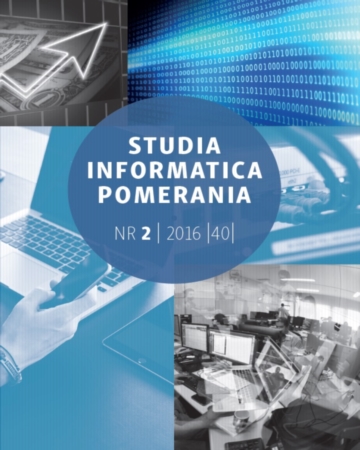
ISSN: 2451-0424
eISSN: 2300-410X
OAI
DOI: 10.18276/si.2016.39-09


Issue archive /
nr 39
Dylematy interpretacji informacji
(Dilemmas of interpretation of information)
| Authors: |
Bogdan
Stefanowicz
Wyższa Szkoła Informatyki Stosowanej i Zarządzania pod auspicjami Polskiej Akademii Nauk |
| Keywords: | information interpretation of information overinterpretation of information underinterpretation of information |
| Data publikacji całości: | 2016 |
| Page range: | 8 (101-108) |
Abstract
In the article, the problem of information interpretation is considered. As a bases, an infological understanding of the concept information has been assumed. This makes it possible to set that, according to the hermeneutic principles, interpretation of information should take into account several levels. The infological approach claims to take into account at least three levels: (a) data level, where data are considered as elementary units of the message, (b) content level, what means that information is considered as a content of the message, (c) context level.In any case, the process of interpretation is biased with different “noises”. As a result, one obtains biased interpretation. Only very simple cases are free from such erroneous effects. Thus, one can distinguish three cases: (1) the interpretation is proper: the user understands the given information as the sender has assumed; (2) the user founds some news that in fact are not in the massage; this is the case of overinterpretation of information; (3) the user is able to see only a part of the content the message; this is the case of underinterpretation of information.As a conclusion, the author formulates the thesis: there is no possibility for assuring the proper interpretation of information in any case. The only way is to be conscious of such a thread and look for tools of reducing the harmful influence of the above mentioned noises.
Download file
Article file
Bibliography
| 1. | Literatura, T.R. (2013). Analityk informacji w administracji rządowej. W: K. Liedel, P. Piasecka, T.R. Alesandrowicz (red.), Analiza informacji w zarządzaniu bezpieczeństwem, Warszawa: Wydawnictwo Difin. |
| 2. | Berkeley, G. (2009). Trzy dialogi między Hylasem i Filonusem, Warszawa: Wydawnictwo Hachette Polska. |
| 3. | Dobrowolski, J. (2008). Filozofia głupoty. Warszawa: Wydawnictwo Naukowe PWN. |
| 4. | Filutowska, K. (2014). Na czym polega myślenie twórcze. Welcome, 4 kwietnia. |
| 5. | Garczyński S. (1984). Z informacją na bakier. Warszawa: Instytut Wydawniczy Związków Zawodowych. |
| 6. | Goodman, N. (1997). Jak tworzymy świat. Warszawa: Fundacja ALETHEIA. |
| 7. | Marina, J.A. (2010). Porażka inteligencji – czyli głupota w teorii i praktyce, Kraków: Wydawnictwo WAM. |
| 8. | Piekarczyk, A., Zimniewicz, K. (2010). Myślenie sieciowe w teorii i praktyce. Warszawa: Polskie Wydawnictwo Ekonomiczne. |
| 9. | Dunaj, B. (red.), Słownik współczesnego języka polskiego (1996). Warszawa: Wydawnictwo WILGA. |
| 10. | Stefanowicz, B. (2010). Informacja. Warszawa: Oficyna Wydawnicza SGH. |
| 11. | Stefanowicz, B. (2013). O interpretacji informacji. Warszawa: Konferencja Naukowa „Statystyka w służbie biznesu i nauk społecznych”. Wyższa Szkoła Menedżerska, 29–30 listopada. |
| 12. | Sundgren B. (1973). An infological approach to data bases. Stockholm: Skriftserie Statistika, Centralbyran. |
| 13. | Szahaj, A. (2014). O interpretacji. Kraków: Wydawnictwo Autorów i Wydawców Prac Naukowych UNIVERSITAS. |
| 14. | Wheen, F. (2006). Jak brednie podbiły świat, Warszawa: Warszawskie Wydawnictwo Literackie MUZA SA. |